Business Law Assignment: Contract Law, Agency, and Business Judgement
VerifiedAdded on 2022/09/23
|8
|1934
|25
Homework Assignment
AI Summary
This business law assignment analyzes three key legal issues. The first part examines the enforceability of a 'Heads of Agreement' in a business purchase, concluding that it is generally not legally binding unless specific terms are included. The second section addresses the liability of a managing director under the business judgment rule, determining whether the director can be held liable for the company's debts based on their decisions. The final part delves into agency law, exploring contract enforcement by an agent and potential breaches of an agency agreement. The assignment uses the IRAC method to analyze legal issues, providing conclusions for each scenario and referencing relevant legal principles and case law.

Running head: BUSINESS LAW
Public Health
Name:
Institution:
Date:
Public Health
Name:
Institution:
Date:
Paraphrase This Document
Need a fresh take? Get an instant paraphrase of this document with our AI Paraphraser
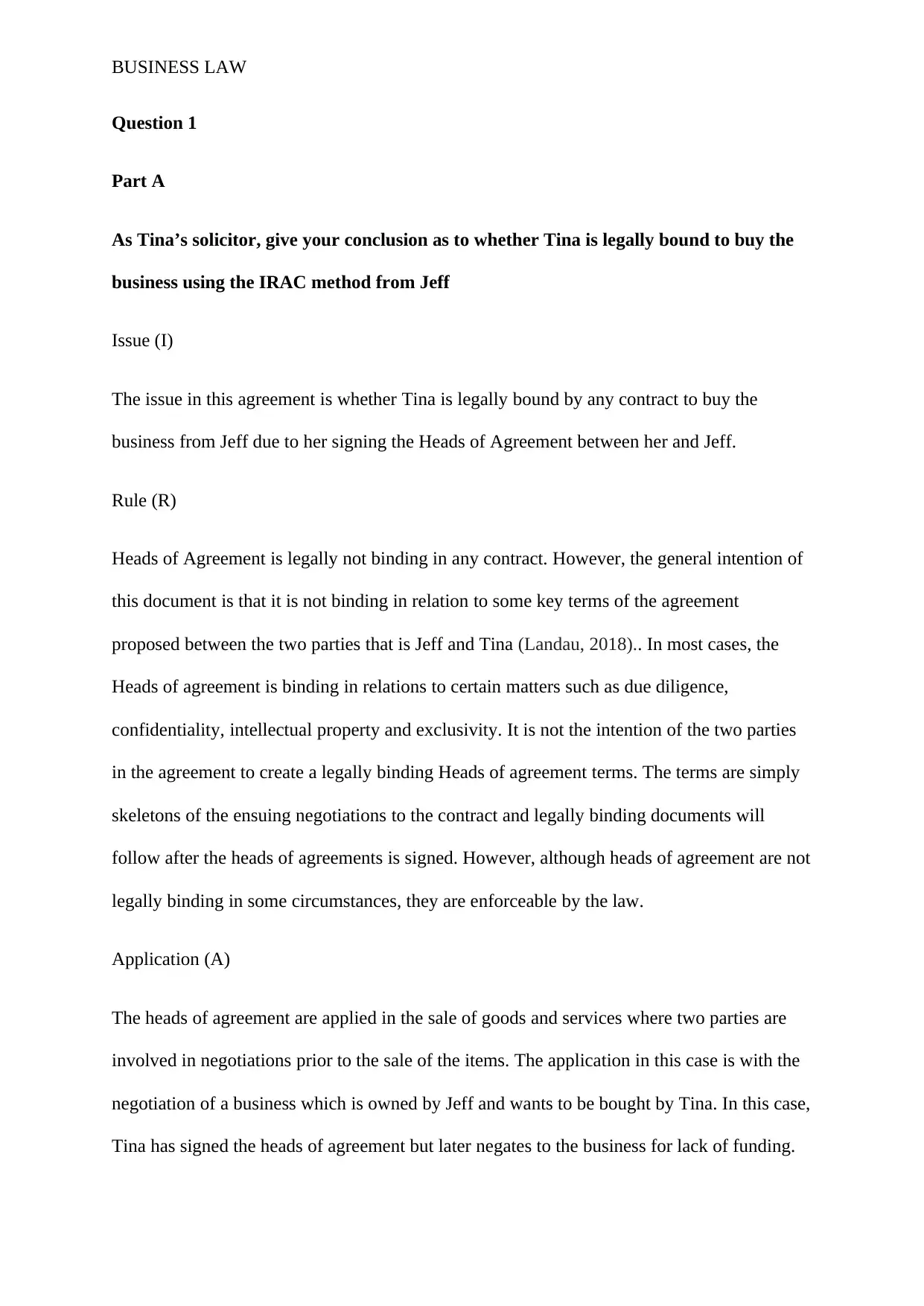
BUSINESS LAW
Question 1
Part A
As Tina’s solicitor, give your conclusion as to whether Tina is legally bound to buy the
business using the IRAC method from Jeff
Issue (I)
The issue in this agreement is whether Tina is legally bound by any contract to buy the
business from Jeff due to her signing the Heads of Agreement between her and Jeff.
Rule (R)
Heads of Agreement is legally not binding in any contract. However, the general intention of
this document is that it is not binding in relation to some key terms of the agreement
proposed between the two parties that is Jeff and Tina (Landau, 2018).. In most cases, the
Heads of agreement is binding in relations to certain matters such as due diligence,
confidentiality, intellectual property and exclusivity. It is not the intention of the two parties
in the agreement to create a legally binding Heads of agreement terms. The terms are simply
skeletons of the ensuing negotiations to the contract and legally binding documents will
follow after the heads of agreements is signed. However, although heads of agreement are not
legally binding in some circumstances, they are enforceable by the law.
Application (A)
The heads of agreement are applied in the sale of goods and services where two parties are
involved in negotiations prior to the sale of the items. The application in this case is with the
negotiation of a business which is owned by Jeff and wants to be bought by Tina. In this case,
Tina has signed the heads of agreement but later negates to the business for lack of funding.
Question 1
Part A
As Tina’s solicitor, give your conclusion as to whether Tina is legally bound to buy the
business using the IRAC method from Jeff
Issue (I)
The issue in this agreement is whether Tina is legally bound by any contract to buy the
business from Jeff due to her signing the Heads of Agreement between her and Jeff.
Rule (R)
Heads of Agreement is legally not binding in any contract. However, the general intention of
this document is that it is not binding in relation to some key terms of the agreement
proposed between the two parties that is Jeff and Tina (Landau, 2018).. In most cases, the
Heads of agreement is binding in relations to certain matters such as due diligence,
confidentiality, intellectual property and exclusivity. It is not the intention of the two parties
in the agreement to create a legally binding Heads of agreement terms. The terms are simply
skeletons of the ensuing negotiations to the contract and legally binding documents will
follow after the heads of agreements is signed. However, although heads of agreement are not
legally binding in some circumstances, they are enforceable by the law.
Application (A)
The heads of agreement are applied in the sale of goods and services where two parties are
involved in negotiations prior to the sale of the items. The application in this case is with the
negotiation of a business which is owned by Jeff and wants to be bought by Tina. In this case,
Tina has signed the heads of agreement but later negates to the business for lack of funding.
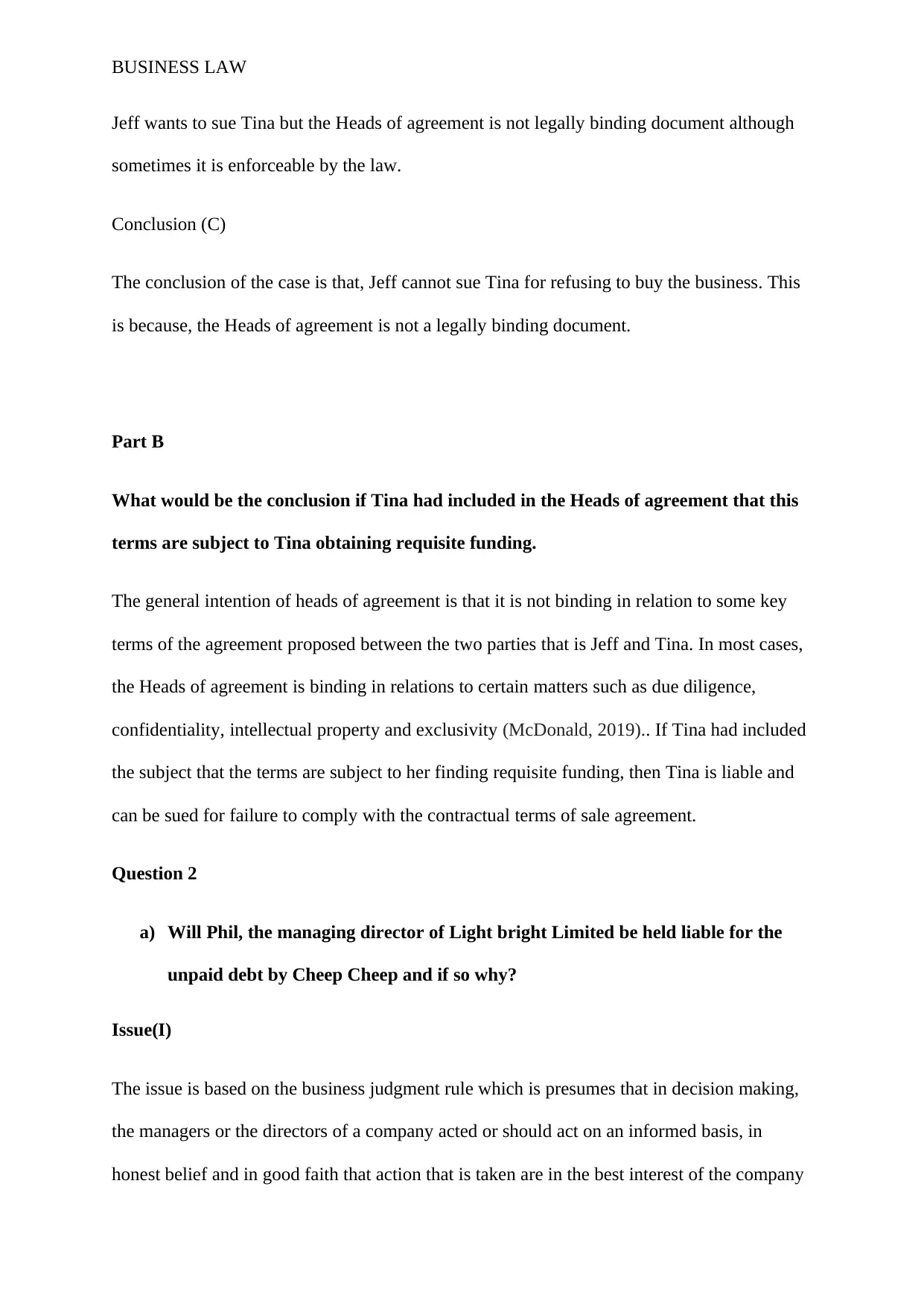
BUSINESS LAW
Jeff wants to sue Tina but the Heads of agreement is not legally binding document although
sometimes it is enforceable by the law.
Conclusion (C)
The conclusion of the case is that, Jeff cannot sue Tina for refusing to buy the business. This
is because, the Heads of agreement is not a legally binding document.
Part B
What would be the conclusion if Tina had included in the Heads of agreement that this
terms are subject to Tina obtaining requisite funding.
The general intention of heads of agreement is that it is not binding in relation to some key
terms of the agreement proposed between the two parties that is Jeff and Tina. In most cases,
the Heads of agreement is binding in relations to certain matters such as due diligence,
confidentiality, intellectual property and exclusivity (McDonald, 2019).. If Tina had included
the subject that the terms are subject to her finding requisite funding, then Tina is liable and
can be sued for failure to comply with the contractual terms of sale agreement.
Question 2
a) Will Phil, the managing director of Light bright Limited be held liable for the
unpaid debt by Cheep Cheep and if so why?
Issue(I)
The issue is based on the business judgment rule which is presumes that in decision making,
the managers or the directors of a company acted or should act on an informed basis, in
honest belief and in good faith that action that is taken are in the best interest of the company
Jeff wants to sue Tina but the Heads of agreement is not legally binding document although
sometimes it is enforceable by the law.
Conclusion (C)
The conclusion of the case is that, Jeff cannot sue Tina for refusing to buy the business. This
is because, the Heads of agreement is not a legally binding document.
Part B
What would be the conclusion if Tina had included in the Heads of agreement that this
terms are subject to Tina obtaining requisite funding.
The general intention of heads of agreement is that it is not binding in relation to some key
terms of the agreement proposed between the two parties that is Jeff and Tina. In most cases,
the Heads of agreement is binding in relations to certain matters such as due diligence,
confidentiality, intellectual property and exclusivity (McDonald, 2019).. If Tina had included
the subject that the terms are subject to her finding requisite funding, then Tina is liable and
can be sued for failure to comply with the contractual terms of sale agreement.
Question 2
a) Will Phil, the managing director of Light bright Limited be held liable for the
unpaid debt by Cheep Cheep and if so why?
Issue(I)
The issue is based on the business judgment rule which is presumes that in decision making,
the managers or the directors of a company acted or should act on an informed basis, in
honest belief and in good faith that action that is taken are in the best interest of the company
⊘ This is a preview!⊘
Do you want full access?
Subscribe today to unlock all pages.

Trusted by 1+ million students worldwide
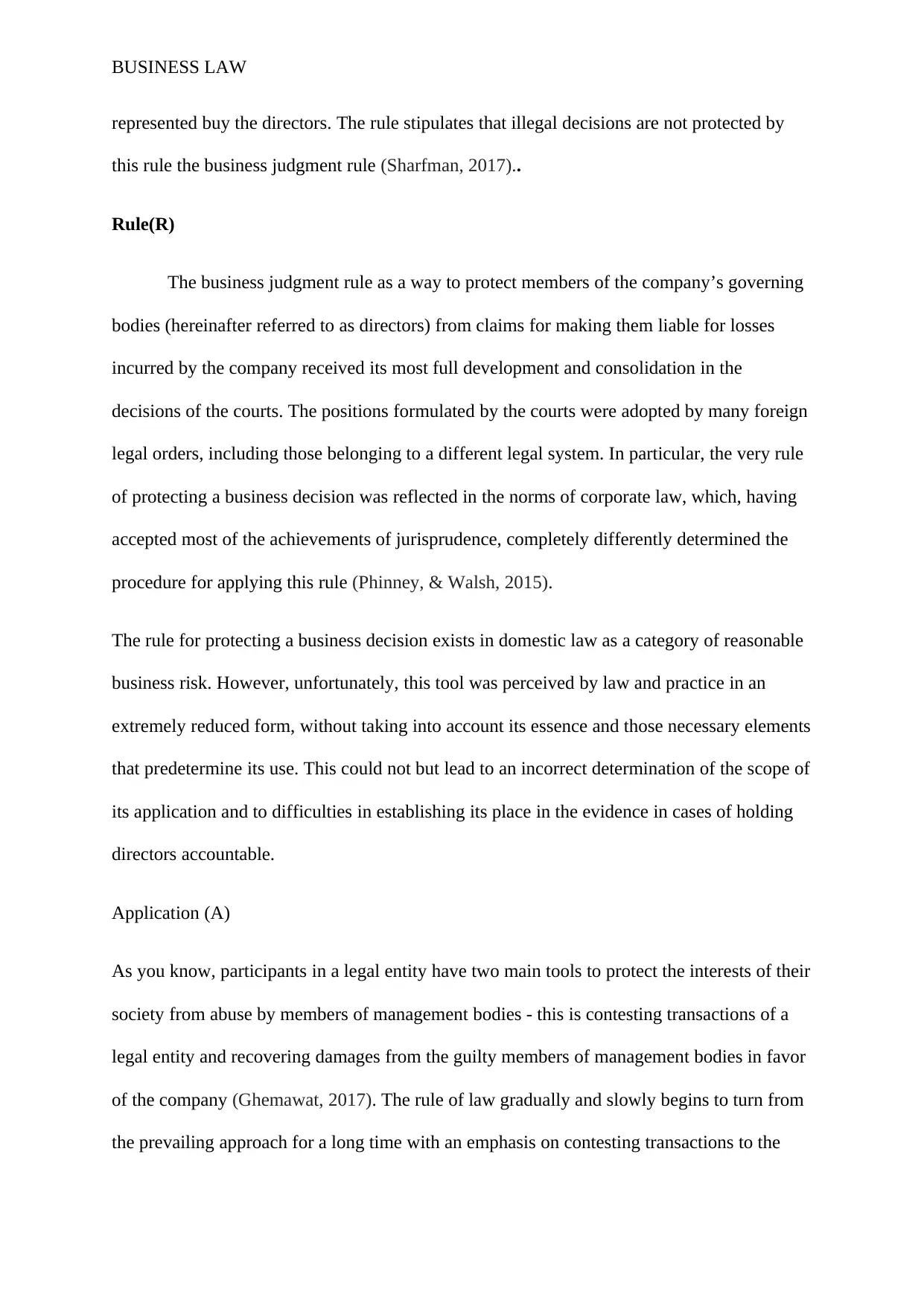
BUSINESS LAW
represented buy the directors. The rule stipulates that illegal decisions are not protected by
this rule the business judgment rule (Sharfman, 2017)..
Rule(R)
The business judgment rule as a way to protect members of the company’s governing
bodies (hereinafter referred to as directors) from claims for making them liable for losses
incurred by the company received its most full development and consolidation in the
decisions of the courts. The positions formulated by the courts were adopted by many foreign
legal orders, including those belonging to a different legal system. In particular, the very rule
of protecting a business decision was reflected in the norms of corporate law, which, having
accepted most of the achievements of jurisprudence, completely differently determined the
procedure for applying this rule (Phinney, & Walsh, 2015).
The rule for protecting a business decision exists in domestic law as a category of reasonable
business risk. However, unfortunately, this tool was perceived by law and practice in an
extremely reduced form, without taking into account its essence and those necessary elements
that predetermine its use. This could not but lead to an incorrect determination of the scope of
its application and to difficulties in establishing its place in the evidence in cases of holding
directors accountable.
Application (A)
As you know, participants in a legal entity have two main tools to protect the interests of their
society from abuse by members of management bodies - this is contesting transactions of a
legal entity and recovering damages from the guilty members of management bodies in favor
of the company (Ghemawat, 2017). The rule of law gradually and slowly begins to turn from
the prevailing approach for a long time with an emphasis on contesting transactions to the
represented buy the directors. The rule stipulates that illegal decisions are not protected by
this rule the business judgment rule (Sharfman, 2017)..
Rule(R)
The business judgment rule as a way to protect members of the company’s governing
bodies (hereinafter referred to as directors) from claims for making them liable for losses
incurred by the company received its most full development and consolidation in the
decisions of the courts. The positions formulated by the courts were adopted by many foreign
legal orders, including those belonging to a different legal system. In particular, the very rule
of protecting a business decision was reflected in the norms of corporate law, which, having
accepted most of the achievements of jurisprudence, completely differently determined the
procedure for applying this rule (Phinney, & Walsh, 2015).
The rule for protecting a business decision exists in domestic law as a category of reasonable
business risk. However, unfortunately, this tool was perceived by law and practice in an
extremely reduced form, without taking into account its essence and those necessary elements
that predetermine its use. This could not but lead to an incorrect determination of the scope of
its application and to difficulties in establishing its place in the evidence in cases of holding
directors accountable.
Application (A)
As you know, participants in a legal entity have two main tools to protect the interests of their
society from abuse by members of management bodies - this is contesting transactions of a
legal entity and recovering damages from the guilty members of management bodies in favor
of the company (Ghemawat, 2017). The rule of law gradually and slowly begins to turn from
the prevailing approach for a long time with an emphasis on contesting transactions to the
Paraphrase This Document
Need a fresh take? Get an instant paraphrase of this document with our AI Paraphraser
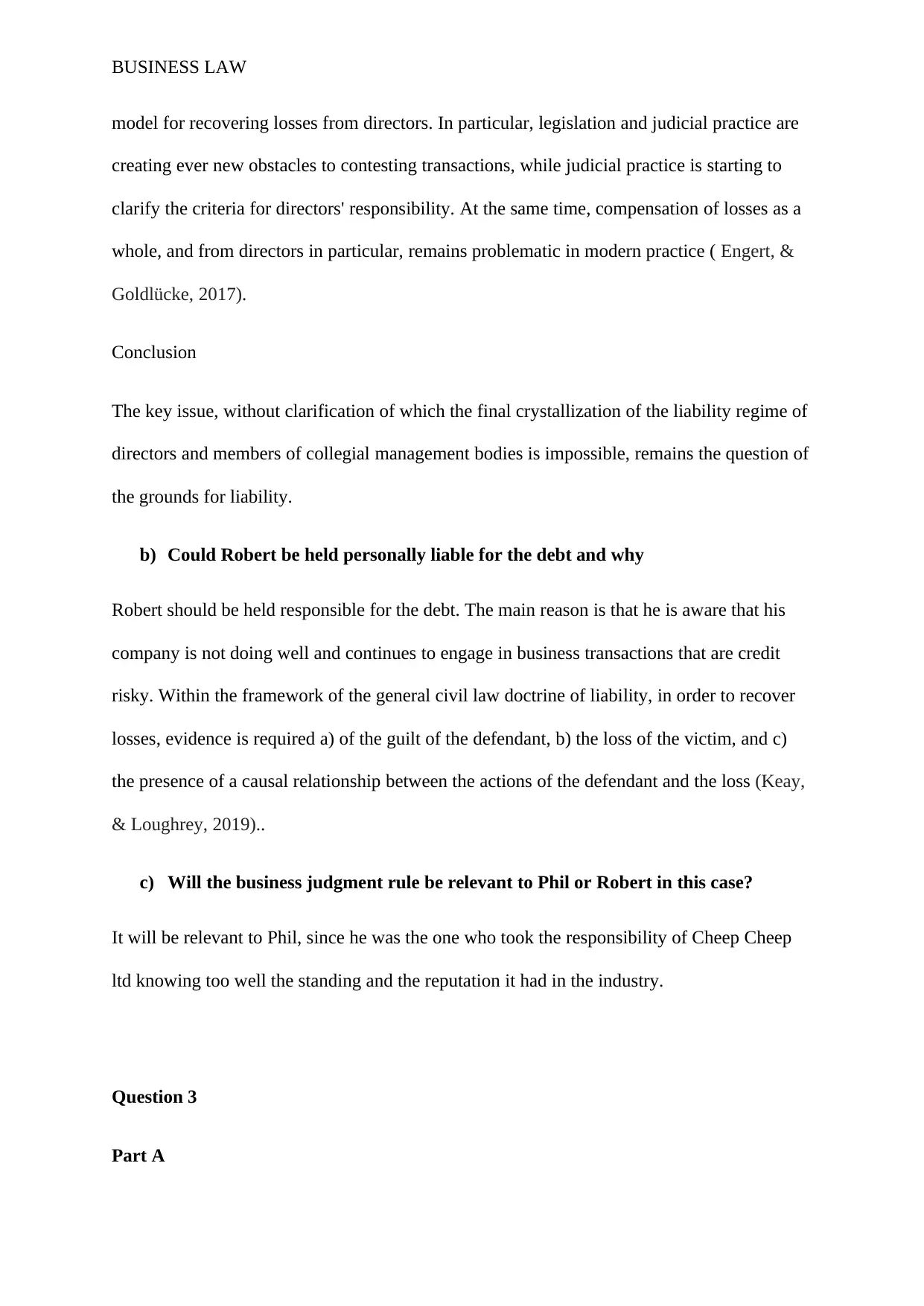
BUSINESS LAW
model for recovering losses from directors. In particular, legislation and judicial practice are
creating ever new obstacles to contesting transactions, while judicial practice is starting to
clarify the criteria for directors' responsibility. At the same time, compensation of losses as a
whole, and from directors in particular, remains problematic in modern practice ( Engert, &
Goldlücke, 2017).
Conclusion
The key issue, without clarification of which the final crystallization of the liability regime of
directors and members of collegial management bodies is impossible, remains the question of
the grounds for liability.
b) Could Robert be held personally liable for the debt and why
Robert should be held responsible for the debt. The main reason is that he is aware that his
company is not doing well and continues to engage in business transactions that are credit
risky. Within the framework of the general civil law doctrine of liability, in order to recover
losses, evidence is required a) of the guilt of the defendant, b) the loss of the victim, and c)
the presence of a causal relationship between the actions of the defendant and the loss (Keay,
& Loughrey, 2019)..
c) Will the business judgment rule be relevant to Phil or Robert in this case?
It will be relevant to Phil, since he was the one who took the responsibility of Cheep Cheep
ltd knowing too well the standing and the reputation it had in the industry.
Question 3
Part A
model for recovering losses from directors. In particular, legislation and judicial practice are
creating ever new obstacles to contesting transactions, while judicial practice is starting to
clarify the criteria for directors' responsibility. At the same time, compensation of losses as a
whole, and from directors in particular, remains problematic in modern practice ( Engert, &
Goldlücke, 2017).
Conclusion
The key issue, without clarification of which the final crystallization of the liability regime of
directors and members of collegial management bodies is impossible, remains the question of
the grounds for liability.
b) Could Robert be held personally liable for the debt and why
Robert should be held responsible for the debt. The main reason is that he is aware that his
company is not doing well and continues to engage in business transactions that are credit
risky. Within the framework of the general civil law doctrine of liability, in order to recover
losses, evidence is required a) of the guilt of the defendant, b) the loss of the victim, and c)
the presence of a causal relationship between the actions of the defendant and the loss (Keay,
& Loughrey, 2019)..
c) Will the business judgment rule be relevant to Phil or Robert in this case?
It will be relevant to Phil, since he was the one who took the responsibility of Cheep Cheep
ltd knowing too well the standing and the reputation it had in the industry.
Question 3
Part A
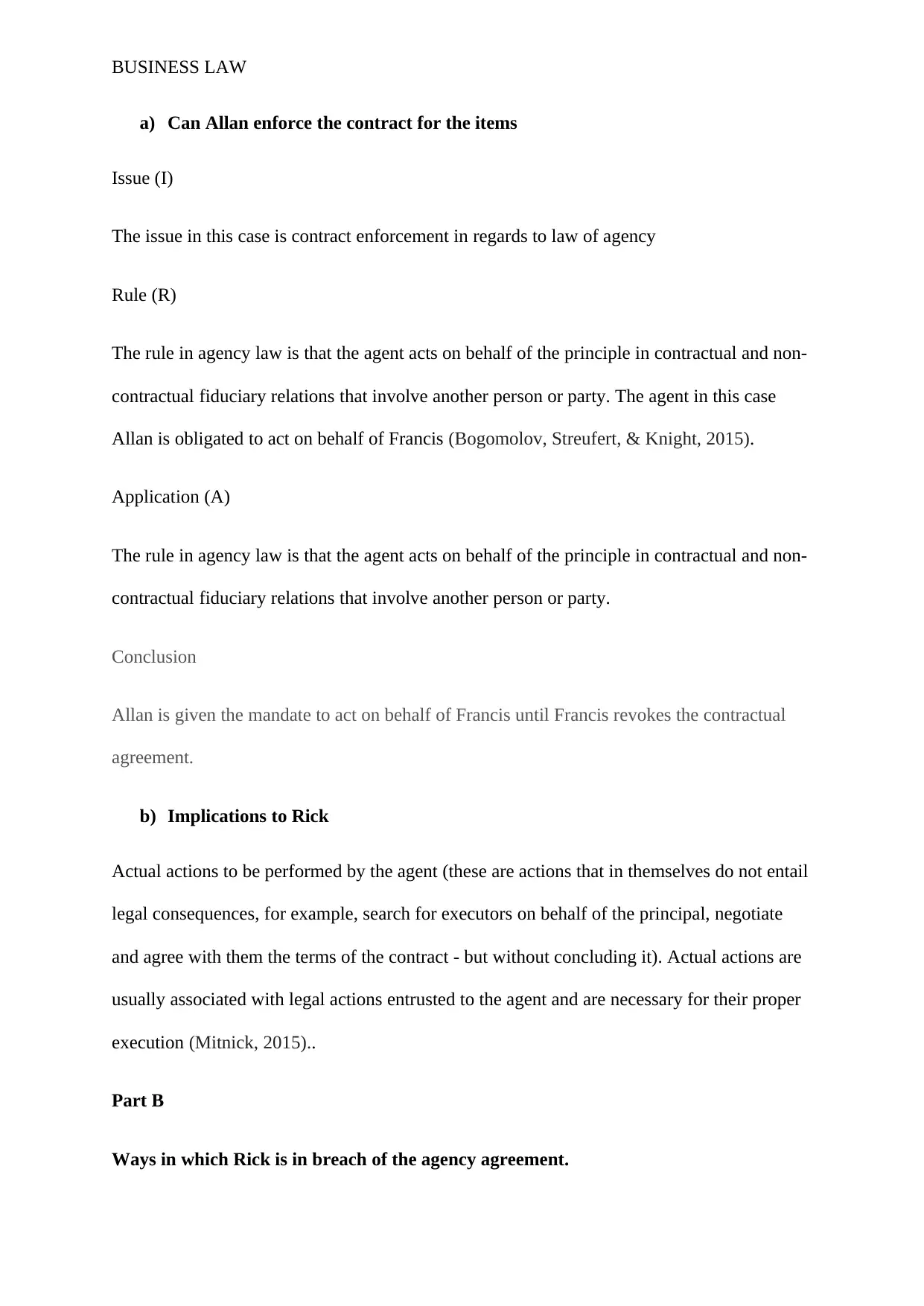
BUSINESS LAW
a) Can Allan enforce the contract for the items
Issue (I)
The issue in this case is contract enforcement in regards to law of agency
Rule (R)
The rule in agency law is that the agent acts on behalf of the principle in contractual and non-
contractual fiduciary relations that involve another person or party. The agent in this case
Allan is obligated to act on behalf of Francis (Bogomolov, Streufert, & Knight, 2015).
Application (A)
The rule in agency law is that the agent acts on behalf of the principle in contractual and non-
contractual fiduciary relations that involve another person or party.
Conclusion
Allan is given the mandate to act on behalf of Francis until Francis revokes the contractual
agreement.
b) Implications to Rick
Actual actions to be performed by the agent (these are actions that in themselves do not entail
legal consequences, for example, search for executors on behalf of the principal, negotiate
and agree with them the terms of the contract - but without concluding it). Actual actions are
usually associated with legal actions entrusted to the agent and are necessary for their proper
execution (Mitnick, 2015)..
Part B
Ways in which Rick is in breach of the agency agreement.
a) Can Allan enforce the contract for the items
Issue (I)
The issue in this case is contract enforcement in regards to law of agency
Rule (R)
The rule in agency law is that the agent acts on behalf of the principle in contractual and non-
contractual fiduciary relations that involve another person or party. The agent in this case
Allan is obligated to act on behalf of Francis (Bogomolov, Streufert, & Knight, 2015).
Application (A)
The rule in agency law is that the agent acts on behalf of the principle in contractual and non-
contractual fiduciary relations that involve another person or party.
Conclusion
Allan is given the mandate to act on behalf of Francis until Francis revokes the contractual
agreement.
b) Implications to Rick
Actual actions to be performed by the agent (these are actions that in themselves do not entail
legal consequences, for example, search for executors on behalf of the principal, negotiate
and agree with them the terms of the contract - but without concluding it). Actual actions are
usually associated with legal actions entrusted to the agent and are necessary for their proper
execution (Mitnick, 2015)..
Part B
Ways in which Rick is in breach of the agency agreement.
⊘ This is a preview!⊘
Do you want full access?
Subscribe today to unlock all pages.

Trusted by 1+ million students worldwide
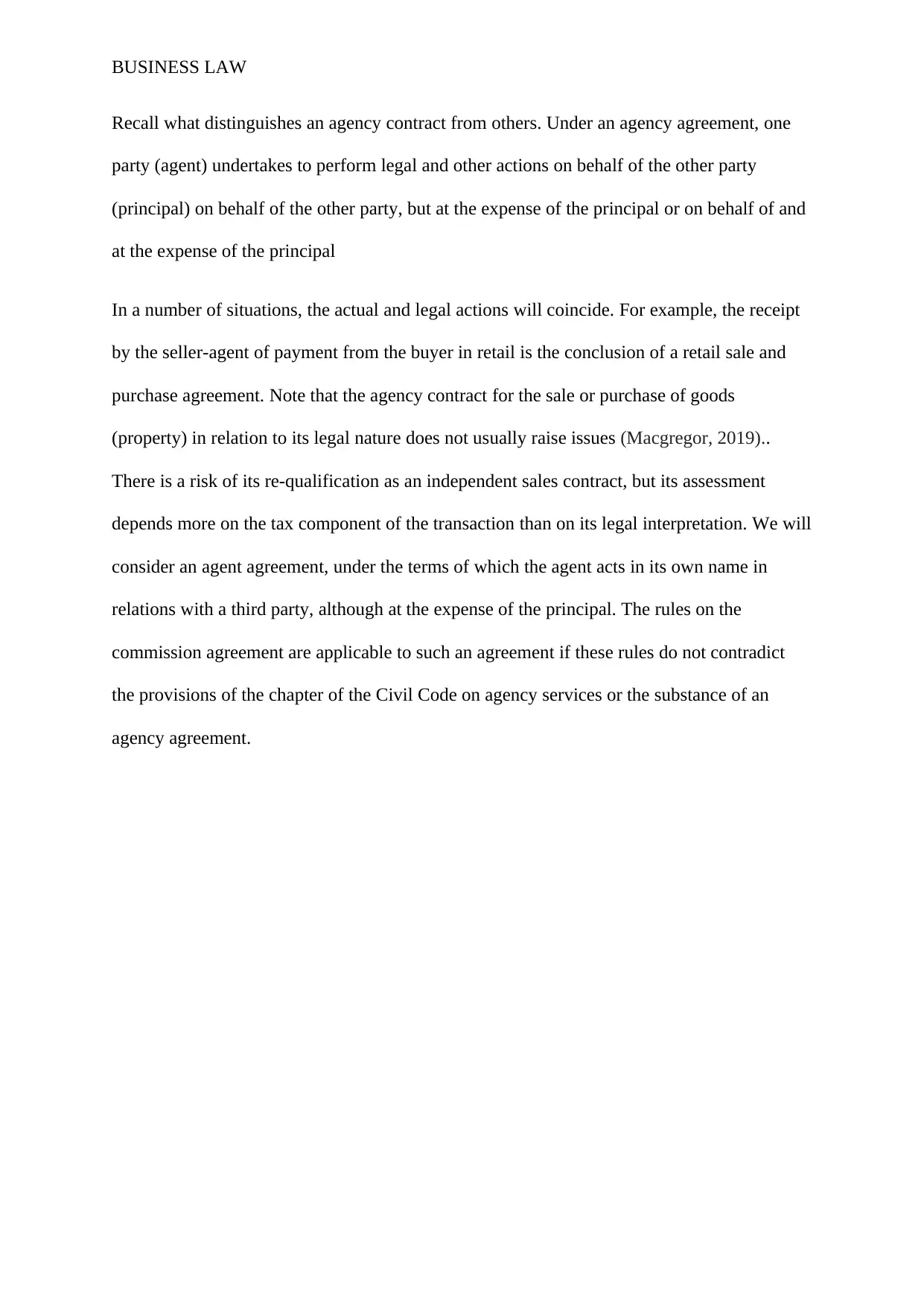
BUSINESS LAW
Recall what distinguishes an agency contract from others. Under an agency agreement, one
party (agent) undertakes to perform legal and other actions on behalf of the other party
(principal) on behalf of the other party, but at the expense of the principal or on behalf of and
at the expense of the principal
In a number of situations, the actual and legal actions will coincide. For example, the receipt
by the seller-agent of payment from the buyer in retail is the conclusion of a retail sale and
purchase agreement. Note that the agency contract for the sale or purchase of goods
(property) in relation to its legal nature does not usually raise issues (Macgregor, 2019)..
There is a risk of its re-qualification as an independent sales contract, but its assessment
depends more on the tax component of the transaction than on its legal interpretation. We will
consider an agent agreement, under the terms of which the agent acts in its own name in
relations with a third party, although at the expense of the principal. The rules on the
commission agreement are applicable to such an agreement if these rules do not contradict
the provisions of the chapter of the Civil Code on agency services or the substance of an
agency agreement.
Recall what distinguishes an agency contract from others. Under an agency agreement, one
party (agent) undertakes to perform legal and other actions on behalf of the other party
(principal) on behalf of the other party, but at the expense of the principal or on behalf of and
at the expense of the principal
In a number of situations, the actual and legal actions will coincide. For example, the receipt
by the seller-agent of payment from the buyer in retail is the conclusion of a retail sale and
purchase agreement. Note that the agency contract for the sale or purchase of goods
(property) in relation to its legal nature does not usually raise issues (Macgregor, 2019)..
There is a risk of its re-qualification as an independent sales contract, but its assessment
depends more on the tax component of the transaction than on its legal interpretation. We will
consider an agent agreement, under the terms of which the agent acts in its own name in
relations with a third party, although at the expense of the principal. The rules on the
commission agreement are applicable to such an agreement if these rules do not contradict
the provisions of the chapter of the Civil Code on agency services or the substance of an
agency agreement.
Paraphrase This Document
Need a fresh take? Get an instant paraphrase of this document with our AI Paraphraser
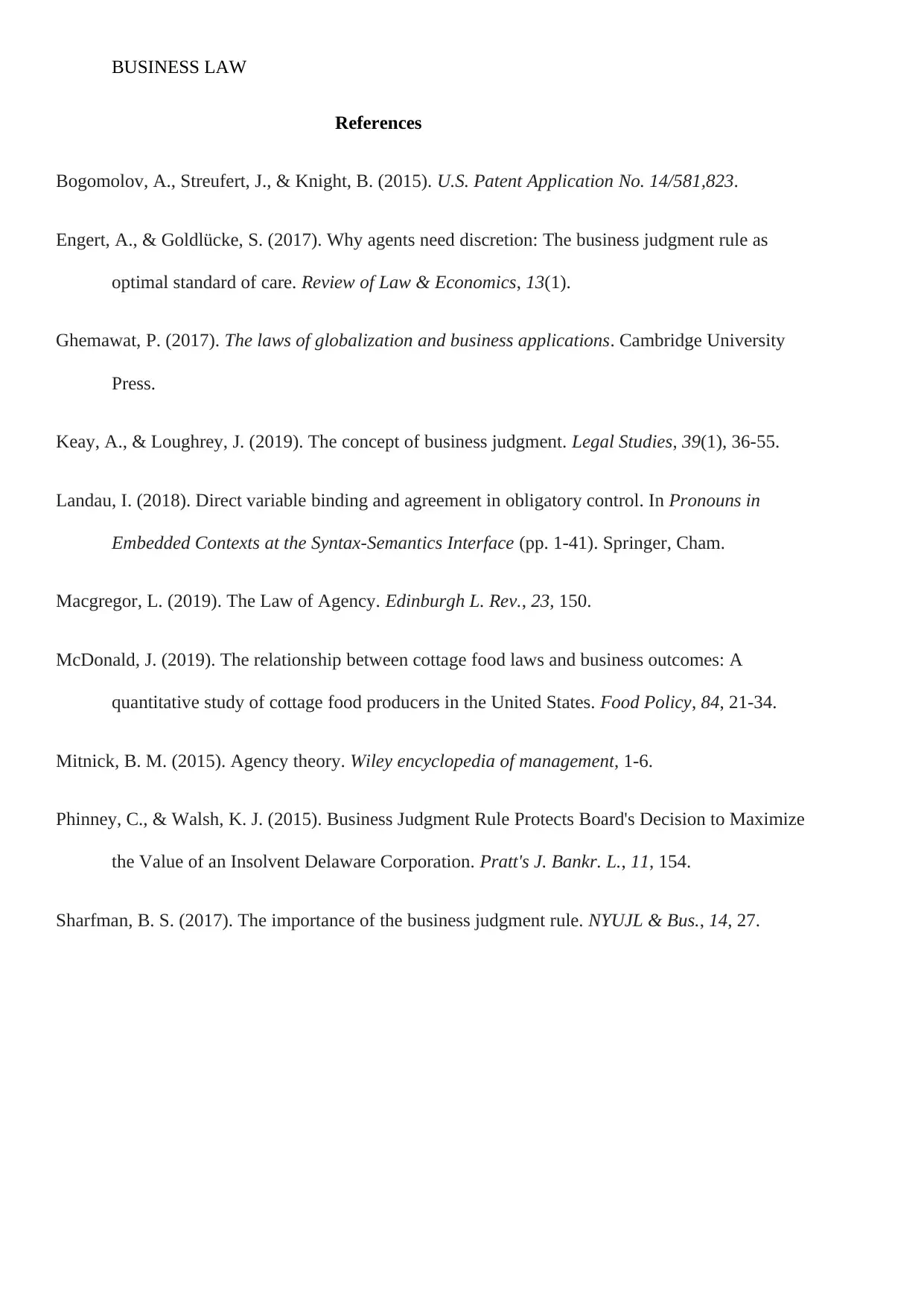
BUSINESS LAW
References
Bogomolov, A., Streufert, J., & Knight, B. (2015). U.S. Patent Application No. 14/581,823.
Engert, A., & Goldlücke, S. (2017). Why agents need discretion: The business judgment rule as
optimal standard of care. Review of Law & Economics, 13(1).
Ghemawat, P. (2017). The laws of globalization and business applications. Cambridge University
Press.
Keay, A., & Loughrey, J. (2019). The concept of business judgment. Legal Studies, 39(1), 36-55.
Landau, I. (2018). Direct variable binding and agreement in obligatory control. In Pronouns in
Embedded Contexts at the Syntax-Semantics Interface (pp. 1-41). Springer, Cham.
Macgregor, L. (2019). The Law of Agency. Edinburgh L. Rev., 23, 150.
McDonald, J. (2019). The relationship between cottage food laws and business outcomes: A
quantitative study of cottage food producers in the United States. Food Policy, 84, 21-34.
Mitnick, B. M. (2015). Agency theory. Wiley encyclopedia of management, 1-6.
Phinney, C., & Walsh, K. J. (2015). Business Judgment Rule Protects Board's Decision to Maximize
the Value of an Insolvent Delaware Corporation. Pratt's J. Bankr. L., 11, 154.
Sharfman, B. S. (2017). The importance of the business judgment rule. NYUJL & Bus., 14, 27.
References
Bogomolov, A., Streufert, J., & Knight, B. (2015). U.S. Patent Application No. 14/581,823.
Engert, A., & Goldlücke, S. (2017). Why agents need discretion: The business judgment rule as
optimal standard of care. Review of Law & Economics, 13(1).
Ghemawat, P. (2017). The laws of globalization and business applications. Cambridge University
Press.
Keay, A., & Loughrey, J. (2019). The concept of business judgment. Legal Studies, 39(1), 36-55.
Landau, I. (2018). Direct variable binding and agreement in obligatory control. In Pronouns in
Embedded Contexts at the Syntax-Semantics Interface (pp. 1-41). Springer, Cham.
Macgregor, L. (2019). The Law of Agency. Edinburgh L. Rev., 23, 150.
McDonald, J. (2019). The relationship between cottage food laws and business outcomes: A
quantitative study of cottage food producers in the United States. Food Policy, 84, 21-34.
Mitnick, B. M. (2015). Agency theory. Wiley encyclopedia of management, 1-6.
Phinney, C., & Walsh, K. J. (2015). Business Judgment Rule Protects Board's Decision to Maximize
the Value of an Insolvent Delaware Corporation. Pratt's J. Bankr. L., 11, 154.
Sharfman, B. S. (2017). The importance of the business judgment rule. NYUJL & Bus., 14, 27.
1 out of 8
Related Documents
Your All-in-One AI-Powered Toolkit for Academic Success.
+13062052269
info@desklib.com
Available 24*7 on WhatsApp / Email
![[object Object]](/_next/static/media/star-bottom.7253800d.svg)
Unlock your academic potential
Copyright © 2020–2026 A2Z Services. All Rights Reserved. Developed and managed by ZUCOL.




